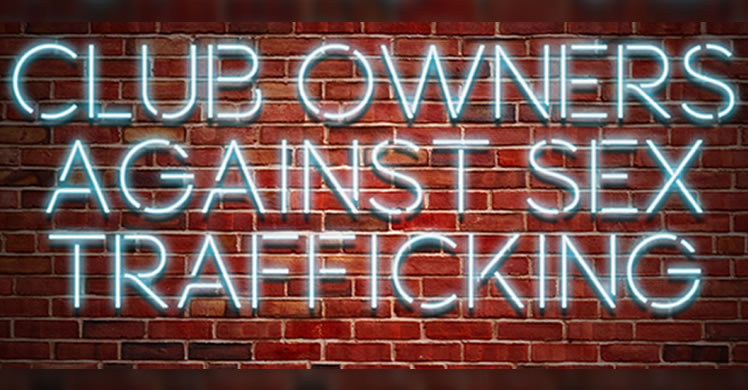HSI, club operators forge partnership to combat sex trafficking
A group with a name like Club Operators Against Sex Trafficking (COAST) doesn't want any part of sex trafficking in their adult entertainment establishments. And U.S. Immigration and Customs Enforcement's (ICE) Homeland Security Investigations (HSI), a lead federal law enforcement agency in combating human trafficking, is the first such agency to give club owners and their associates the training they need to help stop it.
The unlikely alliance between adult entertainment club owners and a federal law enforcement agency got its start when COAST founder and president Michael Ocello reached out to the Department of Homeland Security and ICE for assistance after he was questioned by authorities about a woman in one of his clubs believed to have been trafficked. The investigation found no trafficking. But the incident opened Ocello's eyes to the problem, and he wanted to be part of the solution.
"HSI was incredibly open minded and foresighted to work with our industry," said Ocello who owns 16 clubs throughout the United States. "At first, there was initial skepticism on both sides of the fence. But we've built up such trust that I tell others that it's been a great experience working with HSI – they are true to their word. Every HSI special agent I've talked to is victim-centered. That's not something a lot of people expect from the folks who wear badges and carry guns."
To HSI, being victim-centered means treating human trafficking victims like victims, not criminals. HSI assists them with the social services they need for their safety and recovery, and this assistance is not tied to successful prosecution of their perpetrators. The agency believes in keeping victims informed and engaged. HSI operates from the premise that credible, reliable witnesses need to feel safe and secure.
Special Agent Dave Meadows, who coordinates HSI's relationship with COAST, summed up HSI's stance saying, "Human trafficking is a serious crime against people. It's simply the right thing to do to take people out of these horrific situations."
Special Agent Bill Williger from HSI Tampa, who participates in outreach events to educate audiences about human trafficking, said that "COAST members are legitimate business owners who want to protect their brand and keep their employees safe."
Supervisory Special Agent Dwayne Angebrandt, who conducts anti-human trafficking training in Los Angeles, echoes this view saying, "COAST is taking a stand to tell potential traffickers, 'not in my club; not on my watch.'"
A typical training session includes not only club owners, but others in the business, such as entertainers, wait staff, bartenders and bouncers. Williger said 150 people attended the first COAST training he gave in Tampa, Florida. Ninety percent of the attendees were entertainers, and ten percent were club owners. In his second training session, that demographic flipped with more club owners than entertainers.
The training generally begins with an audio recording of a sex trafficking victim interview followed by a PowerPoint presentation, during which time questions are taken.
"During the audio, we have a lot of crying from training participants," said Williger. "Once the shock of the interview wears off, some training participants believe they may have seen sex trafficking happening, but at the time were not aware of what they had witnessed."
The training focuses on awareness. Presenters teach club owners and their employees what to look for when it comes to sex trafficking. For instance, is the same man picking up or dropping off a woman every day? Are there signs of physical abuse? Does the woman have unusual looking tattoos? These could all be signs of sex trafficking.
Williger says that training participants are surprised by the pervasiveness of human trafficking. By the same token, Williger says that he has been surprised about the willingness of the club owners to attend the trainings and eagerness to work with law enforcement to combat sex trafficking. "In the past," Williger said, "law enforcement was held at arm's length, and now we are welcomed with open arms."
"The relationship between HSI and COAST has opened a door that was previously closed in combating human trafficking," said Williger.
HSI's ultimate objective is to get information about human trafficking to the public. The knowledge that COAST attendees gain from HSI doesn't begin and end at a nightclub. For instance, an entertainer might be at a hair or nail salon when she witnesses a potential human trafficking situation. Not only will she be more likely to recognize the signs of this crime, but hopefully, she'll advise law enforcement officials.
Angebrandt says, "HSI wants the attendees to take what they've seen and heard in the training and make it a topic of discussion in their daily lives."
COAST is spreading the word regarding human trafficking. The organization has produced tens of thousands of "baseball cards," which they give out to the public. The cards list human trafficking indicators, as well as the HSI Tip Line and phone number.
Additionally, a COAST member in the Houston area donated $1 million to the city of Houston to create a human trafficking task force within the police department in cooperation with HSI.
To date, HSI field offices around the country have conducted anti-human trafficking presentations to more than 4,600 employees in the adult nightclub industry employed by over 331 clubs.
HSI relies on tips from the public to dismantle human trafficking organizations. HSI encourages the public to keep their eyes and ears open to suspicious activity. Trafficking victims are often hidden in plain sight, voiceless and scared. The public can report suspected human trafficking to the HSI Tip Line at 1-866-DHS-2ICE or report tips online.


